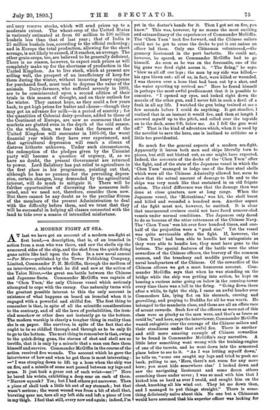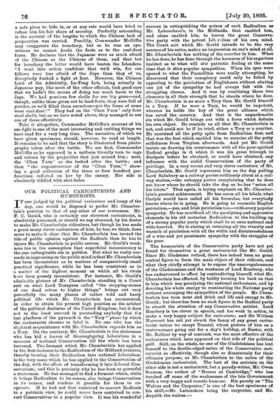A MODERN FIGHT AT SEA.
AT last we have got an account of a modern sea-fight at first hand,—a description, that is, of an ironclad in action from a man who was there, and saw the shells rip the armoured sides of the ship, and the shot from the quick-firing guns rattle like hail upon the deck. In a new naval annual —Per Mare—published by the Tower Publishing Company, Limited, Commander P. N. McGiffin, through the medium of an interviewer, relates what he did and saw at the action of the Yaloo River,—the great sea-battle between the Chinese and Japanese fleets. Commander McGiffin was captain of the Chen Yuen,' the only Chinese vessel which seriously attempted to cope with the enemy. One naturally turns with the greatest possible interest to this the only account in existence of what happens on board an ironclad when it is engaged with a powerful and skilful foe. The first thing to remember is that, in spite of all the scientific considerations to the contrary, and of all the laws of probabilities, the iron- clad somehow or other does not instantly go to the bottom. The modern warship is clearly a tougher thing in reality than she is on paper. She survives, in spite of the fact that she ought to be so riddled through and through as to be only fit to go to the bottom. The next thing to remember is that, owing to the quick-firing guns, the storms of shot and shell are so terrific, that it is only by a miracle that a man can face them himself and survive. Commander McGiffin in the course of the action received five wounds. The account which he gave the interviewer of how and when he got them is most interesting : -•-•" I was stooping down to lift up a hose when the ship was on fire, and a missile of some sort passed between my legs and arms. It just took a graze out of each wrist—see !" Here he bared his wrists, exhibiting a deep scar on each of them. "Narrow squeak P Yes ; but I had others yet narrower. Then a piece of shell took a little bit out of my stomach ; but that wasn't serious ; the worst wound was from a bit of shell that, bursting near me, tore all my left side and left a piece of iron in my thigl. I feel that still, every now and again; indeed, I'm yet in the doctor's hands for it. Then I got set on fire, you know." This was, however, by no means the most exciting and extraordinary of the experiences of Commander licGiffiu. The Chen Yuen' took fire forward, and the Chinese sailors could not be got to cross the decks to put it out unless an officer led them. Only one Chinaman volunteered,—the gunnery lieutenant in the port barbette. He could not, however, be spared, so Commander McGiffin had to go himself. As soon as he was on the forecastle, one of the big guns was fired right across it. "The firing," he says. "blew us all off our legs ; the man by my side was killed,— his eyes blown out : all of us, in fact, were killed or wounded. I was thrown over a hose that had been cut by a shot, and the water spurting up revived me." Here he found himself in perhaps the most awful predicament that it is possible to conceive. "I opened my eyes, and looked right down the muzzle of the other gun, and I never felt in such a devil of a funk in all my life. I watched the gun being trained at me a few seconds before I could do anything. It got steadier, 1 realised that in an instant it would fire, and then at length I screwed myself up to the pitch, and rolled over the top-side on to the deck, some 8 ft. below me. As I fell the gun went off." That is the kind of adventure which, when it is used by the novelist to save the hero, one is inclined to criticise as a little too providential.
So much for the general aspects of a modern sea-fight. Apparently it leaves both men and ships literally torn to pieces, but still not blotted out, as one might have expected. Indeed, the accounts of the decks of the Chen Yuen' after the fight, and of the state of the Japanese vessel in which the Chen Yuen' managed to lodge one of the four steel shells which were all the Chinese Admiralty allowed her, seem to show that the actual amount of damage to life and to the ships was very much like that sustained in an old frigate action. The chief difference was that the damage then was done at close quarters, now at long range. When the Japanese vessel, the Metnshima,' was hit, the shell burst and killed and wounded a hundred men. Another aspect of the fight must not, however, be omitted. It is clear that unarmoured cruisers could not have faced armour-clad vessels under normal conditions. The Japanese only dared to do so because of the utter rottenness of the Chinese Navy. The Chen Yuan' was hit over four hundred times, and one- half of the projectiles were a "good size." Yet the vessel was quite serviceable after the fight. If, however, the Chen Yuen' had been able to handle her antagonists as they were able to handle her, they must have gone to the bottom. The special features of the battle were the utter cowardice of the Chinese officers, the bravery of the common seamen, and the treachery and muddle prevailing at the naval headquarters of the Chinese. Of the cowardice of the Chinese officers we get a most humorous account. Com- mander McGiffin says that when he was standing on the bridge while the ship was getting into action, he kept on hearing a curious noise going on below in the conning-tower every time there was a lull in the firing. "Going down there after a while, to fight the ship, I came an awful header over Commodore Lin, lying flat on his stomach, cursing and grovelling, and praying to Buddha for all he was worth. He belonged to the mandarin class, and these are all an effete race of arrant cowards. Such few of the officers as were not of this class were as plucky as the men were, and that's as brave as could be," and here, says the interviewer, Commander McGiffin waxed eulogistic over the courage of the Chinese sailors and their steadiness under that awful fire. There is another and still more amazing example of Chinese cowardice to be found in Commander McGiffin's racy narrative. A little later something went wrong with the training-engine of one of the turrets, and he went down into the armoured place below to see to it. " As I was letting myself down,' he tells us, "some one caught my legs and tried to push me back, yelling to me, Here, there's not room for any more here ; you must hide somewhere else.' I looked down and saw the navigating lieutenant and some dozen others crouching there under cover ; I was so mad with him that I kicked him as hard as ever I could, and caught him on the chest, knocking all his wind out. They let me down then, and I managed to put things straight." There is some- thing deliciously naive about this. No one but a Chinaman would have assumed that his superior officer was looking for
a safe place to hide in, or at any rate would have tried to refuse him his fair share of security. Perfectly astounding is the account of the lengths to which the Chinese lack of preparation was carried. Possibly, Commander McGiffin may exaggerate the treachery, but as he was an eye- witness we cannot doubt the facts as to the coal-dust fuses. He declares that the Japanese were as much afraid of the Chinese as the Chinese of them, and that but for treachery the latter would have beaten the Islanders. "I went into action confident that we'd win, for our fellows were less afraid of the Japs than they of us. Everybody funked a fight at first. However, the Chinese Lord of the Admiralty, Lo-Feng Lob, being actually in Japanese pay, like most of the other officials, took good care that we hadn't the means of doing too much harm to the Japs. We had precious few shells for our big guns—and, though, unlike those given out to land-forts, they were full of powder, as we'd filled them ourselves—yet the fuses of some were coal-dust ! " They had on the Chen Yuen' only four steel shells, but as we have noted above, they managed to use one of these effectively.
Take it altogether, Commander McGiffin's account of his sea.fight is one of the most interesting and exciting things we have read for a very long time. The narrative, of which we have given specimens, should, however, be read at length. It remains to be said that the story is illustrated from photo- graphs taken after the battle. We see first, Commander McGiffin as he appeared in a uniform literally torn to rags and tatters by the projectiles that just missed him ; next, the Chen Yuen' as she looked after the battle; and then " the superstructure of the ' Chen Yuen,' " show- ing a good collection of the three or four hundred per- forations inflicted on her by the enemy. Her side is absolutely riddled with shot-holes.



































 Previous page
Previous page